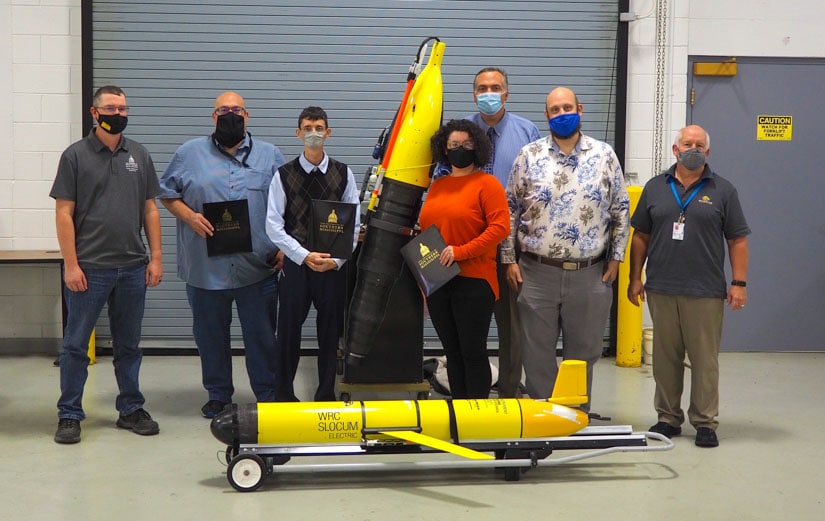The University of Southern Mississippi’s (USM) School of Ocean Science and Engineering (SOSE) recently celebrated the first graduates of the Uncrewed Maritime Systems (UMS) Tier 2 Operator Certificate Program.
In November, five Naval Oceanographic Office (NAVOCEANO) students were recognized as the first to complete the Tier 2 Operator Certificate Program.
The Tier 2 Operator Certificate course is the second UMS certificate offered by USM. The five-week course covers the characteristics of specific uncrewed platform types and focuses on the operation of buoyancy vehicles. Students learn how to operate sea gliders, including planning a mission, piloting, launching and recovery.
In the Fall 2021 course, students earned valuable real-world operations experience by piloting a USM sea glider that was deployed prior to the start of the class to conduct hurricane monitoring 150 miles offshore in the Gulf of Mexico. At the end of the course, the class went out on the R/V Jim Franks to recover the sea glider.
“This real-world situation of piloting a USM glider in the field allowed students the opportunity to conduct daily analyses of real-time engineering and scientific data from the system,” said Kevin Martin, USM uncrewed systems instructor.
Within the Tier 2 program, students learn the characteristics of specific platforms and sensors, as well as physical environmental factors affecting UMS in both operational and research and development settings. The curriculum draws knowledge from real-world case studies of specific situations, sensors and platforms.
“Understanding the vehicles and sensor characteristics is critical to a successful mission execution,” said Neil Van de Voorde, USM uncrewed systems instructor.
The University of Southern Mississippi is the only four-year institution in the United States to offer an Uncrewed Maritime Systems Certificate Program (Tiers 1 and 2). USM’s Tier 1 Certificate Program began in 2017. In Tier 1, students learn foundational material in oceanography and ocean engineering principles related to uncrewed undersea and surface vehicles (UUVs and USVs), such as powered vehicles and gliders.
“Obtaining the hands-on experiences with multiple system types within the course allows students to understand commonalities between the systems, as well as understand operational variability in the systems,” said Martin.
For more information about the Uncrewed Maritime Systems Certificate Program at USM, visit https://www.usm.edu/ocean-




